#animal motif
Text
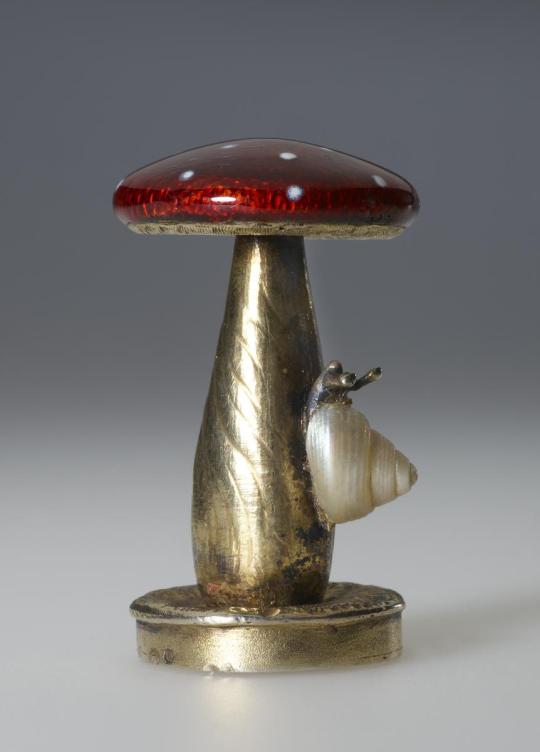
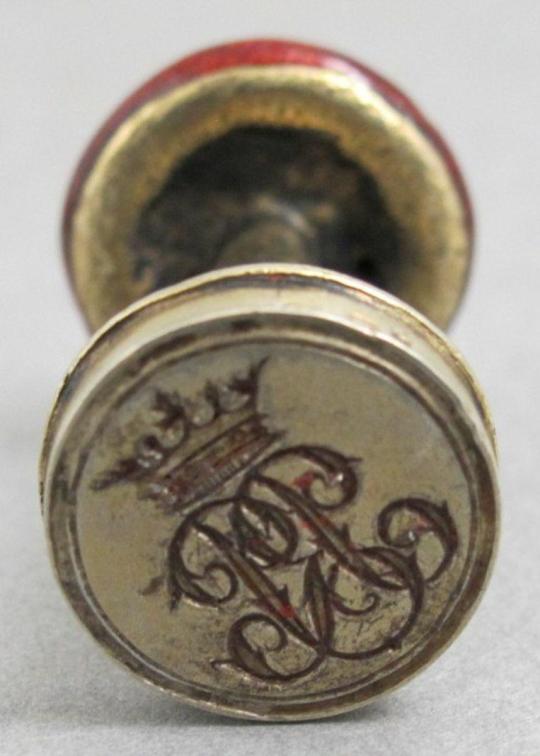
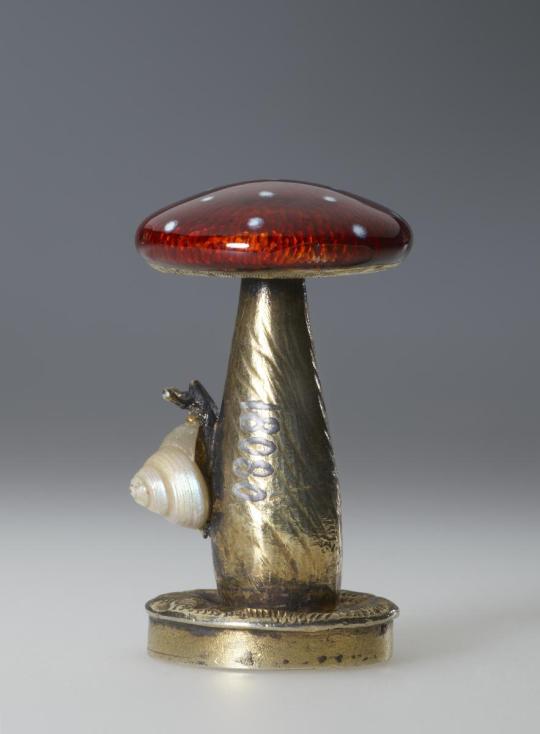
Stamp Seal with a Toadstool Base. Manufactured in the 2nd half of the 19th century, presumed Russian origin. Materials are vermeil (silver gilded with gold), enamel paint and shell. From the Musée d'Art et d'Histoire, Geneva, inventory number: 018080.
(Source: mahmah.ch)
#stamp seal#wax seal#trinkets#mid 1800s#late 1800s#russian design#nature motif#animal motif#mushrooms#snails#metal#enamel#shell#red#grey
5K notes
·
View notes
Photo
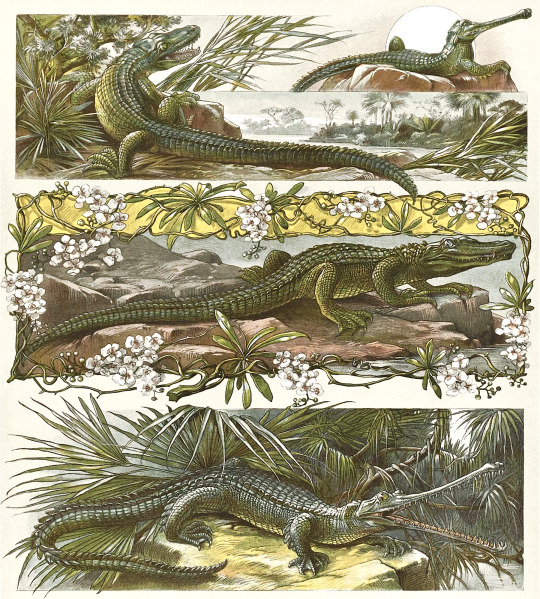
Das Thier in der decorativen Kunst - Anton Seder - 1896 - via Internet Archive
2K notes
·
View notes
Text
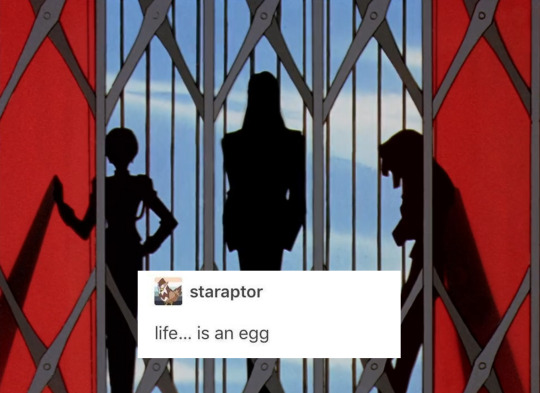
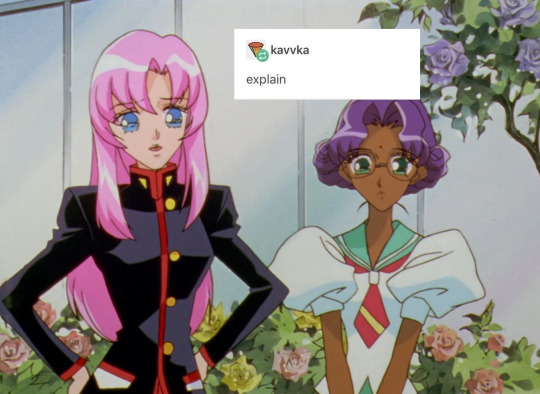

utena text posts (eggs post version)
460 notes
·
View notes
Text
Kaz has three animal motifs all to himself
The Crow
The Dog
The Shark
The Crow
This one is the most apparent. It's his symbol, the sign of his gang, the tattoo on his arm, the name of his crew, the bird that nests around his territory.
The crow represents many things: death, danger, misfortune and illness. Kaz identifies with all of these, and uses them as his armour. He brings and causes death, he is dangerous, it is people's misfortune to cross him, he allegedly causes people's flesh to wither and die at his touch. However, it also describes his life. Everyone he has cared about has died, he lives in constant danger in the Barrel, misfortune caused him to catch the plague, be mistaken for dead, thrown on the Barge, and lose his brother. He became ill with the Queen's Lady Plague and "died". But crows also represent: rebirth, self-reflection, intelligence, and loyalty. Kaz was reborn in the Ketterdam harbour. He decided to never love again to never hurt again, believing love to be the cause of loss. He's scarily intelligent, probably the smartest man in the city. His gang is loyal and his crew is loyal - he gathers people around him that will never betray him. Jesper, his second that will do anything Kaz says. Inej, the girl who would kill a dozen men to protect him.
Also: "Crows remember the faces of the people who wronged them. But they also remember those that were kind. They tell each other who to watch out for, and who to look after." Kaz remembers everyone who has ever wronged him and goes after them in a bloody quest for vengeance, but he also looks after his people.
He is deeply associated with the crow, but he also personally relates to it.
The Dog
One of his nicknames is "Per Haskell's rabid dog" and he has all of the qualities that the dog symbolises.
Dogs symbolise: guidance, protection, loyalty, fidelity, faithfulness, alertness, and love, strength, courage, and tenacity.
Guidance: Kaz is a leader. He's a gang leader, he's the leader of the crows. He makes the plans and finds the resolutions of problems and difficulties that they face. But he also helps others, in his own way. He never judges Nina for what she did to Matthias, and not only does he focus more on what Wylan can do instead of what he can't, he gives him advice. He tells Wylan that he should not be ashamed, that shame eats men whole, that he doesn't need to be able to read to be valuable.
Protection: Kaz is very protective. When Inej got stabbed, he killed a dozen men and carried her all the way to safety despite his limp. He has his crew's back in a fight. He offers safety and protection to his gang: threatening retaliation if one of his own is hurt. He gives Wylan his father's empire. He lies for Jesper to Colm and refuses to give Jesper the parem. He looks after his own.
Loyalty: Kaz is committed to the Dregs. They are his gang and he does his best to look after them. He made their revenue, makes them money, insulates the house, pays for the water. He looks after them in a fight, too. And of course, he expects the loyalty back.
Fidelity: He is exclusively loyal to his gang, and his friends. When Pekka says that he offers a Kaz a place in the Dime Lions Kaz deadpans that he'd rather "be roasted on a spit with Van Eck turning the handle". This is partly because he utterly despises Pekka, but it is also partly that the Dregs are his people. He may not exactly see them as a family but he cannot deny that that is what they are. "Did Muzzen have any family?" "Just the Dregs." Kaz admits that the Dregs are a family, and Inej says that Per Haskell was a little like a father to Kaz, and Kaz like a son to Haskell. He wouldn't betray them.
Faithfulness: He is true to his word and never breaks a promise once he has given it.
Alertness: Kaz is always alert. He's always ready for a fight, or for something to go wrong.
Love: At Kaz's core, he deeply believes in love. His motivation for revenge was not that he got conned out of money, it was the loss of his brother and the feeling of betrayal that Pekka caused by pretending to replace the family he had lost, only to snatch everything away. Whenever he threatens someone, he threatens to hurt their loved ones, because he believes it's the worst kind of pain - he experienced it himself. He loves Inej so much that he's willing to try and better himself for her. He accidentally calls Jesper by his dead brother's name.
Strength: Kaz is strong - physically, emotionally, and mentally. Physically, he dangled a clerk by the legs from the top of a light house for an extended period of time, fought a whole gang on his own, and many other feats. He can handle running and fighting even when he is in agony. Emotionally, he manages to maintain a poker face at everything and almost nothing fazes him; when something does, he doesn't dwell on the pain, but on how to get revenge or how to save the person being hurt. Mentally, he managed to push past the trauma and swim back to shore from the Reaper's Barge using his dead brother's body as a raft. He was able to try and push past the trauma to try loving Inej.
Courage: Kaz is brave, and strong in the face of pain and grief. He went and fought the Dregs on his own, has survived so much and still kept going.
Tenacity: Kaz never stops. He's persistent and he won't ever quit. He doesn't quit on his revenge at Pekka, he doesn't quit even when the Dregs nearly kill him in the Slat fight. He keeps trying until he gets what he wants.
The Shark
Kaz's eyes are often compared to that of a shark: black and cold. He also has the qualities that the shark is a symbol for.
The shark symbolises: power, superiority, authority, focus, determination, adaptability, and self-confidence.
Kaz has a lot of power. He is now the king of the Barrel and very rich. He's the leader of his gang and no longer has a boss. No one tells him what to do. He's superior to most in the Barrel - more ruthless, more driven but also, ironically enough, morally superior. Not just in the Barrel, but to more socially acceptable people. He doesn't deal with slavers and despises the skin trade. He is actively against slavers and bawds. Kaz also has a lot of authority. He's the leader, and the Dregs and the Crows follow his orders without question.
Kaz is very focused. Mainly on revenge. He has nothing else in his life, just that primal urge to take down Pekka Rollins. He is also determined in this focus yielding results. He doesn't give up. Ever. Even when everything is falling down around his head, he finds a way to flip it around and end up in control again.
Kaz is extremely adaptable. He became what he had to be to survive the Barrel. He became cruel and mean and ruthless because that's what it took to survive the Barrel. When something goes wrong on a job he always has a spare plan and when those run out (which is rarely) he is good at improvisation. He can turn even what seems like an utter loss, into a win.
Kaz is very self-confident. Arrogant, too. He knows that he's good at, and exactly how skilled he is at what he does. He confidently went to the Slat and fought a dozen gang members, he broke into the Ice Court - one of the most impenetrable strongholds in the world, he's confident in his plans, and he knows how to make people stand down, bring them to their knees. He uses people's loved ones against them because everyone has someone they love that he can use, this has no exceptions. Sure, he failed to use Wylan against Van Eck, but he managed with Alys. Using people's loved ones is absolutely a good technique and he knows it. He knows he's skilled in fighting, blackmail, breaking and entering, etc. and he's confident in his abilities.
#he is also a cat cuz he hisses when you approach and won't let you pet him but when you start to show love he goes. oh. that's nice#also he asks for attention in funny ways like breaking into wylan's house and pushing wine glasses off of tables#the dog one is really detailed because at first glance kaz doesn't really display those qualities#but he really really does#also notice how none of them are prey animals#and can be associated with death#kaz brekker#six of crows#six of crows duology#animal motif#i LOVE animal motifs
54 notes
·
View notes
Text

Putting the Dog to sleep, The Antlers
#this song is still insane to me btw#the antlers#putting the dog to sleep#dog motif#animal motif#music#lyric quotes
43 notes
·
View notes
Text
6am exhaustion posting but it’s very funny to me that jack is compared to so many serpents, the biblical serpent in the garden. the ouroboros. the black snake. and then he loves fantasy movies with heroes that crush villains. he reads fairy tales like sleeping beauty, fairy tales that predominantly have knights in shining armor slaying the dragon or the serpent. obviously with him wanting to be a hero he’d follow the KISH archetype, but also look. serpents are medievally satanic symbols. fairy tales are majority stemmed in European Christianity. He’s literally a dragon that wants to be a knight . A satanic if not Thee Satanic Serpent wanting to be a hero and a Knight In Shining Armor and actively partaking in slaying other beasts for acceptance. this vision came to me with caffeine and zero sleep but do you see it .do you see how this is insane and also funny. Do you understand it …..
#cal.txt#okay goodnight this took like an hour to write bc I couldn’t do words#I am not in a healthy state of mind or body 🙌🙌🙌🙌🙌🙌🙌🙌🙌#I have a caffeine addiction and nonexistent sleep schedule and also I am . burnt out every other day !!!!#anyways .#spn#jack kline#spn ramble#spn meta#media tropes#knight in shining armor#dragons#ouroboros#the chicken and the snake#spn 14x14#supernatural meta#animal motif#Plsase guys does somebody understand this#clutching my head and screaming HE JUST WANTS TO BE GOOD DESPITE WHAT HE IS !!!?!?!!?!#a monster that wants to be a hero . Do You Even Care .#suugghhjfjkgdg#maybe my gummies did kick in#it’s about fucking time it’s been almost thre hours#goondigjttt
74 notes
·
View notes
Text
When you think about it
Logan would be a crow not an owl if we are going to give logan am animal/bird
Owls are not any smater than any other bird but crows are one of the smartest animals, possibly the clossests to human intellegence too
Crows are actually great problem solvers, LIKE LOGAN WITH ANXIETY AND INTRUSIVE THOUGHTS WE'VE SEEN IT TWICE TOO
Crows are great at using the tools and make their own tools, REMEMBER THE SECOND VIDEO ABOUT DEALING WITH INTRUSIVE THOUGHTS WHERE THOMAS USED A FEW TOOLS(music, coloring book and puzzles) TO HELP THOMAS
Crows are great decision makers, great communicators, have amazing reasoning skills, they can make rule guided decisions
ALL OF THESE WORK WELL WITH LOGAN AKA LOGIC AND CROWS ARE INCREDIBLY LOGICAL CREATURES TOO IM JUST SAYING
So what im saying is pleasepleasepleaseplease someone draw logan as crow or with crow motifs thatd be so cool omfg like im just saying it's be so awsome it would be so cool it would be the most incredible fanart of logan the world has ever seen (i will most likely end up making it myself BUT IM STILL THROWING IT OUT THERE)
(someone probably already talked or brought this idea up but i just had to get this off my chest alr?? Ppl probably stopped making him a owl too i think BUT STILL HUSH IT-)
So basically
Janus is a snake
Remus is a octupus
Patton is a frog
Virgil is a spider
Logan is definitly a crow
What is roman? (Idk if ppl gave roman any animal motifs yet so pls tell me any you guys think would work for roman)
#sanders sides#logan sanders#sanders sides logan#sanderssides#crows#ts logan#ts sanders sides#logan is a crow#art idea#idk if theres a tag for when we make these characters have animal motifs uh#animal motif#this is a headcanon#headcanon#sanders sides headcanon#virgil sanders#patton sanders#roman sanders#remus sanders#janus sanders
12 notes
·
View notes
Text
The Best Trope Ever Showdown: Round 1, Side B
Beware the Nice Ones
No propaganda was submitted.
Animal Motif
No propaganda was submitted.
27 notes
·
View notes
Text














My animal motif playlist is thriving
16 notes
·
View notes
Text
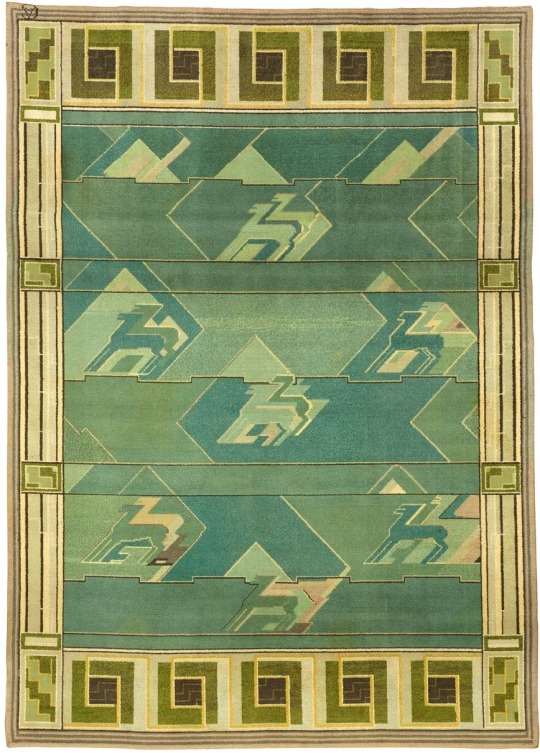
Studio Loja Saarinen (maker), Maja Anderson Wirde (designer)
Rug With Animal Motif
1932
#loja saarinen#maja anderson wirde#textiles#textile design#textile#fabric#modern art#textile designer#art history#textile art#graphic arts#abstract#1930s art#1930s style#1930s fashion#animal motif#rug#rug design#rug designer
31 notes
·
View notes
Text
"animal motifs tend to be gendered" to YOU. to me that man is a fly on the wall and that woman is a feral coyote and that man is a common swift and that girl is an anglerfish and that person is a shelter dog and that man is
#and that man is a stag#anyways this is about our flag means death#ofmd#tma#writing#hannibal#animal motif#maybe/elias' fantastic new thoughts
13 notes
·
View notes
Text
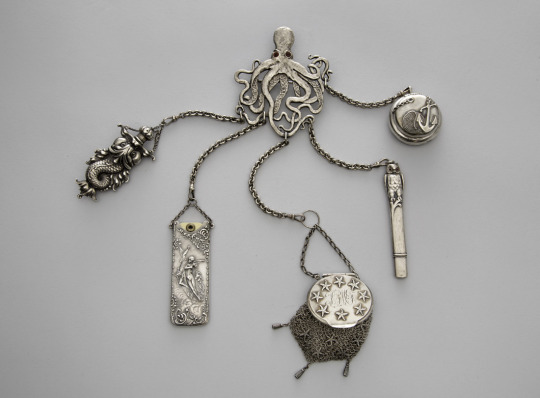
Octopus Chatelaine. Manufactured by William B. Kerr & Co. in Newark, New Jersey, ca. 1900. Medium is 800 silver, sterling silver. From the collection of Mary Nunn, exhibited by SFO Museum for their 'The Allure of Art Nouveau' exhibition, Feb 13, 2016–Aug 26, 2016.
(Source: sfomuseum.org)
#chatelaine#jewelry#decorative arts#early 1900s#american design#art nouveau#animal motif#octopus#marine life#silver#grey#b&w
3K notes
·
View notes
Photo
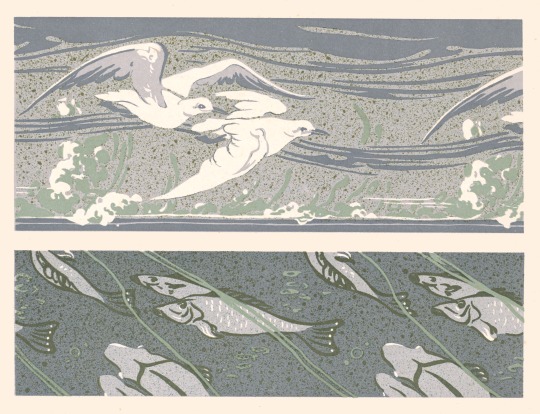
Dekorative farbige Ornamente - Richard Leonhardt - 1920 - via Staatsbibliothek zu Berlin
899 notes
·
View notes
Text
Bird Symbolism in Revolutionary Girl Utena
There is quite a large amount of bird and bird-related imagery, symbolism, allegories and metaphors in Revolutionary Girl Utena, and i think all of them are very interesting. Here is a ~2000 word essay about the topic.
The Birdcage Garden: Anthy and Ohtori Academy
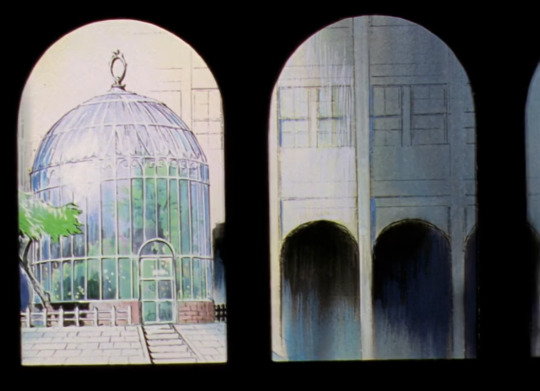
This is perhaps the most obvious of the bird symbols in Utena. It is literally Anthy's cage. It is where she, as the Rose Bride, is supposed to spend her time watering the flowers. Touga talks about never letting her out of it once he wins her, and calls her a "lovely little bird." And doesn't that just sum up what so many people's idealized version of her is like? A pretty thing to be admired, only in captivity.
I think the birdcage can also be seen as a sort of microcosm of Ohtori Academy as a whole. Akio does call the school "a garden where people will never become adults," after all, and Anthy is not the only person trapped there, nor is she the only character associated with birds.
According to this analysis, "Ohtori" as a word can mean "big bird" in japanese, and is also a Japanese term for the Fenghuang bird in Chinese mythology, said to be "beautiful, immortal and rules over all birds." Sounds a lot like a certain someone in charge of this place, doesn't it? Which would make every person in Ohtori a bird, symbolically speaking, trapped in the cage that is the academy and ruled by Akio (who, despite being the biggest, and the one with the most control, is also a caged bird.)
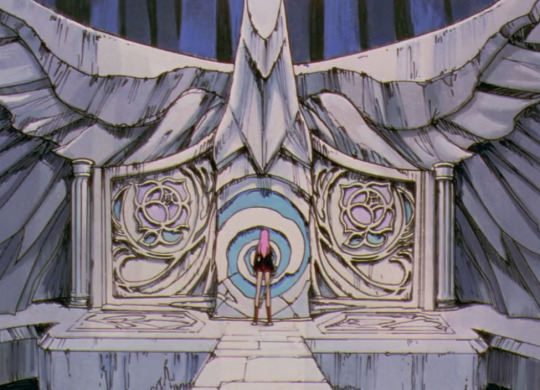
Additionally, the statue on the gate to the dueling arena is in the shape of a bird, before it transforms into a rose when opened. I am not sure exactly what this means, but I assume it is in some way symbolic of Akio, Anthy and Ohtori.
The Bird and the Window: Shiori and Juri
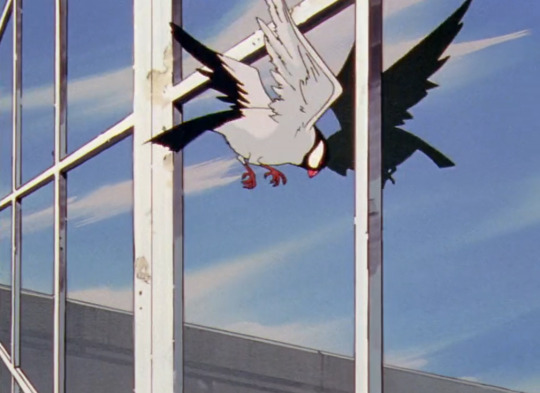
The bird that flies into the window during Shiori and Juri's conversation in episode 17 is a Java Sparrow. Despite its name, it is a part of the Estrildid Finch family, but I think the symbolism for sparrows fits the context more, as they can represent love, devotion and compainionship, all of which are very relevant for Juri and Shiori.
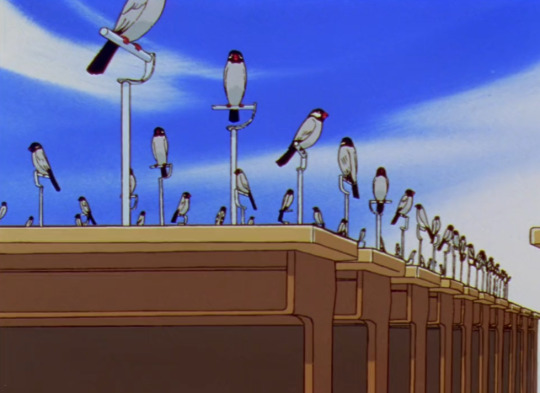
The bird is also the symbolic item for Shiori's black rose duel, which means we should associate the bird mainly with her. What, exactly, is the window, then? I think it is symbolic of Shiori's feelings for Juri, Juri's feelings for Shiori, or most likely both. The bird hits the window directly after Juri says "Is that all you have to say to me?" and turns to leave. The bird hits something it could not see in its flight, just as Shiori hits against something that hurts her, even if she doesn't understand it, in her conversation with Juri. The bird is shown to be lying still, presumably dead, after Juri reveals that she was never in love with the boy Shiori "stole" from her.
The bird is shown again after Juri throws her locket in the lake, and before Shiori finds it in her dorm. I've heard it discussed that this implies the bird retrieved the locket (probably through Anthy-as-Mamiya), and if the bird is symbolic of Shiori and the locket is symbolic of Juri's feelings for her, it would mean Shiori is the one to bring them back after Juri tries to rid herself of them. This makes sense.
The Bird Nest: Kozue and Miki
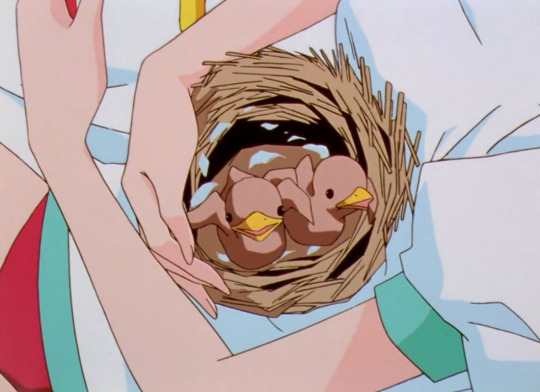
The bird nest that Kozue rescues from the tree that is going to be cut down is symbolic of her and Miki. Or, at least they are symbolic of how Kozue views the two of them. The comparison is pretty straightforward; Kozue projects her and Miki's feelings of abandonment onto these baby chicks, who have been left behind by their parents, just like the two of them were when their parents divorced. I think she projects her protectiveness over her brother moreso than her own feelings about the whole thing, as Kozue likes to think of herself as very independent ("a wild animal") and very unaffected by it all. As seen by her attempt to save the birds in the first place, she is very willing to put herself at risk, and is less concerned with her own feelings/safety.
Now, I don't want to get too much into speculation, but I have to wonder if there was more going on in the Kaoru family than just the divorce and the too-high expectations for the "twin prodigies." Miki's uncharacteristic cynicism in saying "adults who tell you something is for your own good can never be trusted," as well as Kozue's total disregard for authority and her tendency to use her sexuality as a tool both concern me. Although Miki and Kozue's parents are not explicitly shown to be abusive, I do not think it is a stretch to say that there is a possibility that they were. It explains some of Kozue's behaviour in regards to Miki as well. It's not just posesiveness but protectiveness. She has needed to protect him before, and she feels she needs to protect him still (pushing the predatory teacher down the stairs, saving the birds she sees his innocence in.)
Interestingly enough, Anthy interacts with these chicks as well. She advices Miki on how to feed and take care of them. Utena even comments on how unusually straight forward she's being about the whole thing. This might just be another instance of characterizing Anthy as a person who is fond of animals, and that is certainly part of it, but i think there is more to it as well. If these baby birds are symbolic of (Miki and Kozue's, but also a general) feeling of abandonment by parents/adults, as well as their potential abuse, what does that mean for Anthy not only knowing how to take care of them, but being eager to talk about it? Could it perhaps be that she, like Kozue, sees herself in them? Like Kozue, Anthy herself is symbolically a bird, but a caged one in contrast to Kozue's claims of being a wild animal. Could it be that Anthy has had to become an expert in taking care of those (herself) that have been abandoned or failed or abused by the adults in their lives? Rememeber that this is the same episode where she says that Akio is more like a father to her than a brother. A parallel is indirectly being drawn between him and the Kaoru parents.
If Miki and Kozue's parents were abusive, this might be a rare moment of Anthy empathising with other victims, telling them through metaphor how to take care of themselves. Although, it doesn't keep her from continuing to manipulate them, as she goes on to say her line about returning the chicks to their mother, which is what sets Kozue off. Anthy also says that she's never actually raised chicks before. Maybe she's not very good at taking care of them (herself) after all.
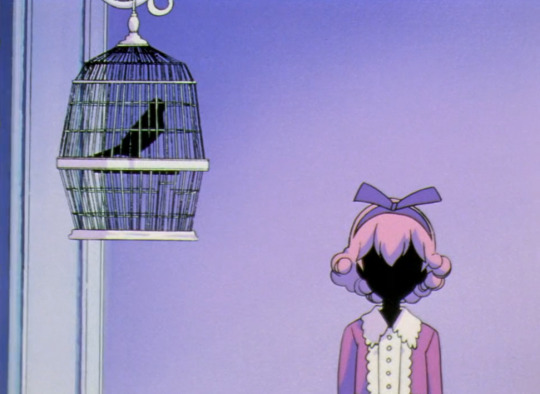
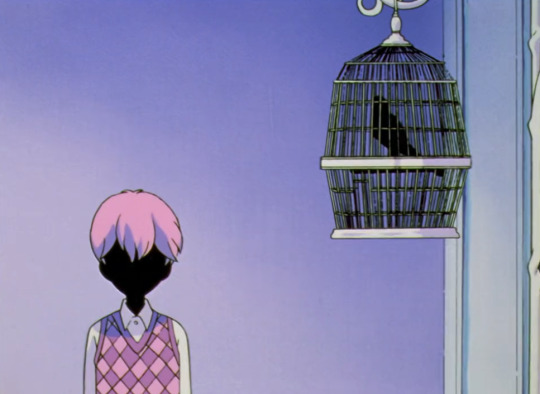
There's also what looks like two caged parakeets in Miki's flashback of their childhood. I assume this has similar meaning to Anthy's birdcage, as a feeling of being trapped, in this case by their parents' expectations for them. Kozue used to be a caged bird, but now claims to be a wild one, despite still being inside the birdcage that is Ohtori.
Brood Parasitism: Nanami and Touga (and Utena)
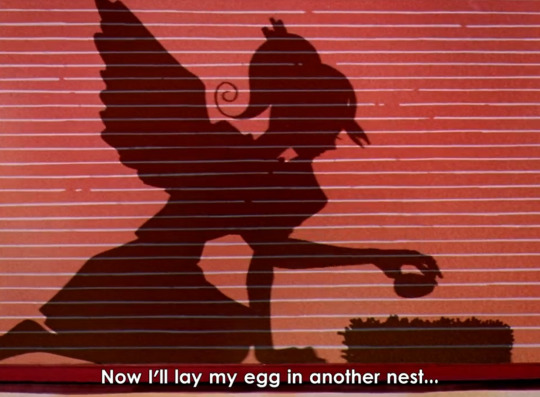
The Kaoru's are not the only sibling pair in Utena to be compared to birds. In Episode 31, Her Tragedy, a pretty unique shadow play is put on in the Chairman's Tower about a cuckoo leaving its egg in another bird's nest, a phenomenon known as brood parasitism. It also references the fairy tale The Ugly Duckling by Hans Christian Andersen. Perhaps the most interesting part of this play is that it's done in the style of the ones in the black rose arc, with C-Ko playing all the roles, the return of the monkey-catching robot, and Utena's fourth-wall breaking commentary at the end. I won't get into what this means, as it doesn't have anything to do with the bird metaphor, but maybe in another post.
This shadow play is about how Nanami and Touga were adopted, and specifically about Nanami's feelings on the matter. Of course adopted children are not parasites, but it makes sense for Nanami to think along those lines, considering her fear of being compared to animals or aliens, and of being ostracized by the society she lives in. Nanami doesn't actually know that she is adopted, only that Touga is, which muddies that interpretation a little. Perhaps it is about Nanami blaming Touga's birth parents for "leaving him in another nest"? Something about her resentment of Touga at this point in time, thinking of him as a parasite in their family? Or simply her fear of what not being his blood-relative means.
I'm more confident about the Ugly Duckling reference, and it being symbolic of Nanami's worry of not fitting in among her peers. Nanami mainly copes with this by thinking that the reason she doesn't fit in, is because she is actually better than everybody else, because she's related to Touga (being a beautiful swan among the common ducks.) The play ends with the cuckoo insisting that it will become a swan one day, when really it can't. It will never be a duck that fits in, either. It will always just be what it is, a parasite (a space-alien. A girl who lays eggs.) This reflects Nanami's despair at the idea that she's "just another fly in the swarm" after her duel in the next episode.
And like all the shadow plays this one can be interpreted as being about Utena as well. She is an orphan who is now being raised in Akio and Anthy's "nest". Although she wasn't placed there by anyone but Akio himself, so it's more about her insecurities about feeling like an outsider in their family. And like the Ugly Duckling/cuckoo, she is also out of place among the rest of the students, and dreams of growing up to be something she can't actually become, in this case a prince. (credits to this analysis on the shadow plays for helping me piece together my thoughts on that. Always cite your sources!)
Cuckoos can also be symbolic of one-sided love, and is the origin of the word cuckoldry. Make of that what you will.
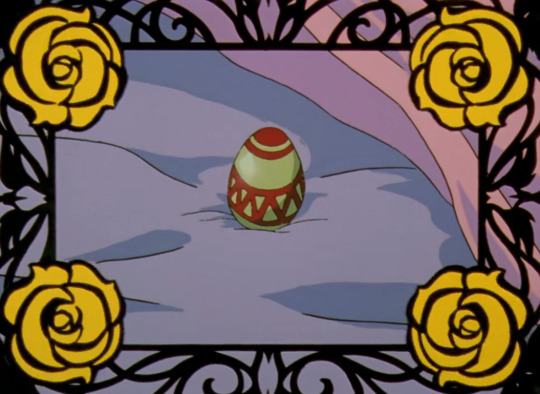
I should mention that Nanami also lays an egg of her own a few episodes prior. ...Or does she?
Her nightmare sequences show her fears of being compared to a chicken, a turtle, a frog, and of course, a space alien, but it is quite obviously a bird egg. And since we are later shown that Anthy has a chicken named Nanami, much like the cow with the same name, it can be assumed that the egg comes from there, and that Anthy brought it to Nanami's bed, perhaps via Chu-Chu. Could this relate to the brood parasitism of the cuckoo in some way? Is this not one bird (Anthy) laying its egg in another bird's (Nanami's) nest (bed) and getting them to raise it? is this what Anthy means when she tells Miki she has never personally raised chicks? Are all of these metaphors connected??? There's also the fan-theory that Nanami's egg hatched a reincarnated Chu-Chu, and in that case would he be the baby cuckoo while Anthy is the mother and Nanami is the duck? I'll be honest I'm not really sure what to make of it at this point. Draw whatever conclusion you want!
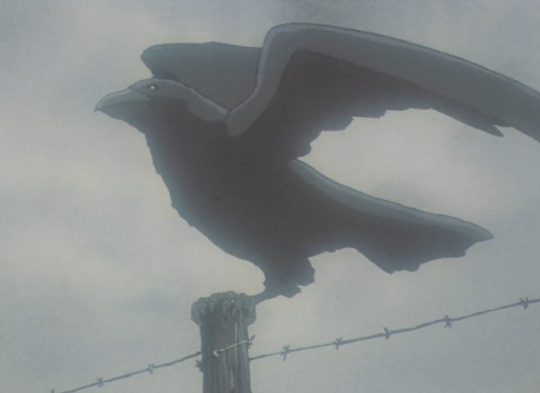
Last and probably least interesting is the third of Nanami associated bird imagery: the crow in episode 10. Crows can be symbolic of death, and it feels safe to say that this one is just here to set the mood of the scene, and as visual confirmation that the kitten did indeed die. Not too much to say there.
The Chicken and the Egg: The Student Council
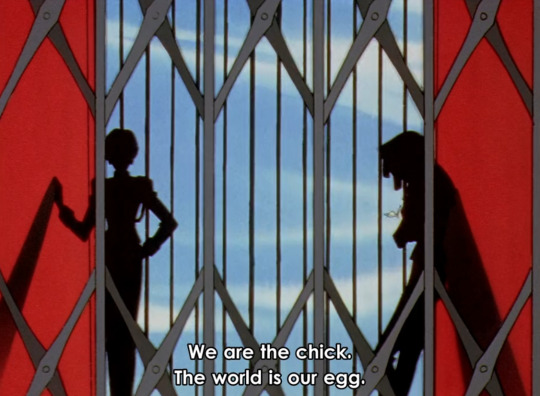
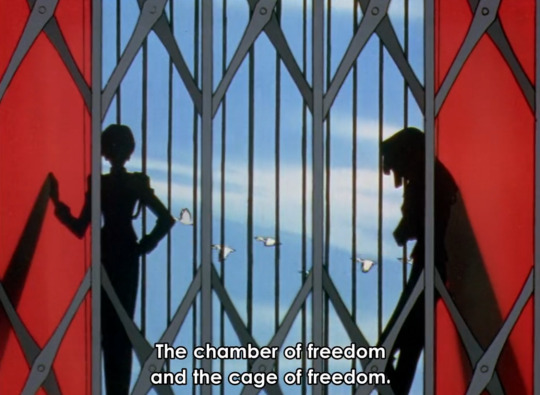
I'd be remiss if i didn't mention the student council's chicken and egg speech in this post as well, even if it has been analyzed to hell and back by hundreds of people before me. It is a reference to Hermann Hesse's book Demian. It is about breaking out of childhood and into adulthood. It is about escaping Ohtori, which is both the egg and the cage (and interestingly enough, during the speech birds can be seen flying by outside the cage of the elevator.) In Nanami's version of the egg speech she mentions "the cage of freedom" and how it cares for the chick. This something that ideally should be true for schools. A place that limits children, but in a way that prepares them for the adult world. Of course, Ohtori as a system has no interest in this, as it is a cage in its most literal sense: a place to keep people trapped. Trapped in their harmful behaviours, in their lack of growth, in their idealized memories of the past, and most of all, in childhood.
And with that, we have come full circle back to Anthy's birdcage as a symbol for all of Ohtori. Thanks for reading :)
#it's done! my first proper analysis-essay since my very first post on this account!!#i know it's long but i put a lot of work into this and i'd really appreciate if you read it ^_^#although i'm not entirely satisfied with the juri/shiori segment. if anyone has anything to add i'd love that#revolutionary girl utena#analysis#anthy#akio#shiori#juri#kozue#miki#nanami#touga#utena#m#animal motif#kaoru siblings#kiryuu siblings
281 notes
·
View notes
Text
They should invent a cat motif
7 notes
·
View notes
Text
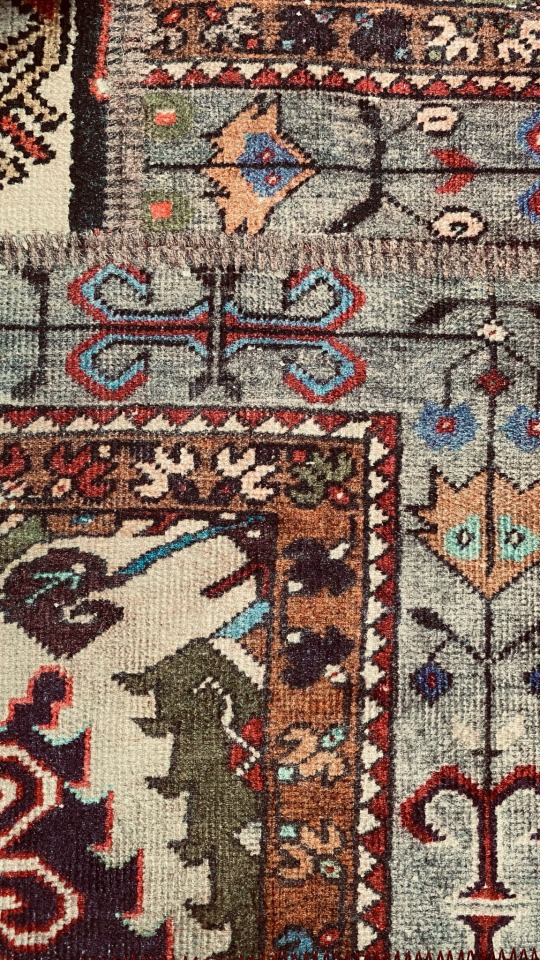
traditional Turkish kilim/rug
#444minerva777#kilimrug#traditional art#turkish mythology#turkish culture#pattern#turkish history#animal motif#motifs#art and culture#artistic#turkish#oriental rugs#turkic#türk kültürü#türk tarihi#halı#desen#sanatsal#keşfedilmeyen#takip edilesi bloglar#takipleselim#ok to rb#i need likes
27 notes
·
View notes